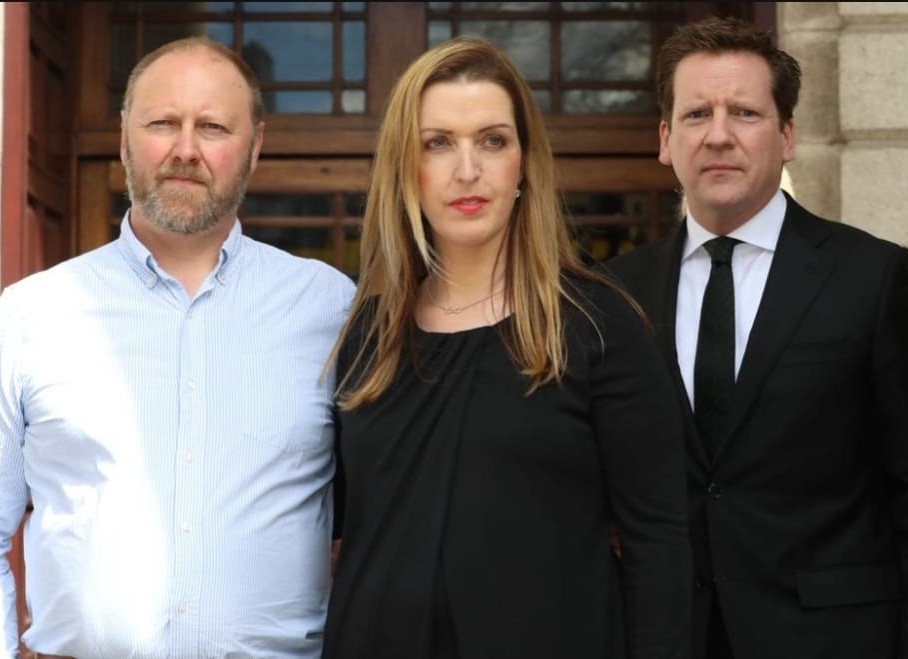The Woman Who Refused to Stay Silent – Vicky’s Fight for Truth
This week, we remember Vicky Phelan — a woman whose courage and determination exposed the greatest medical scandal of our time. On 25th April 2018, Vicky’s refusal to be silenced by a Non-Disclosure Agreement revealed systemic failures within our health system that endangered the lives of so many women. Her brave decision was not made for herself, but for all of us. In doing so, she lit a torch of truth that forced long-overdue accountability from those in power.
Vicky Phelan became the face of one of Ireland’s most devastating healthcare failures when, on April 25th, 2018, she stood on the steps of the High Court after settling her case against Clinical Pathology Laboratories without admission of liability. Diagnosed with terminal cancer in 2017, Vicky discovered that her 2011 cervical smear test had been incorrectly reported as clear, and that this information had been withheld from her for three years. Rather than quietly accepting a settlement that would have silenced her through a non-disclosure agreement, she made the courageous decision to speak out, revealing that potentially hundreds of other Irish women had also received false negative results through the CervicalCheck screening program.
Her refusal to be silenced exposed systemic failures within Ireland’s healthcare system and sparked a national reckoning that would eventually reveal at least 221 women had been affected by similar misreadings of their tests, with many developing terminal cancer that might have been prevented with earlier intervention. Vicky’s extraordinary act of courage, undertaken while facing her own mortality, led to multiple investigations, the establishment of patient support groups, and fundamental reforms in how healthcare is delivered and how patients are treated within the Irish health system. Until her death in November 2022, she remained a tireless advocate for accountability, transparency, and patient-centred healthcare, ensuring that no other woman would suffer in silence as she had.

Because of Vicky, the truth was dragged into the light — and because of Vicky, no woman would unknowingly walk that lonely path again.
In the wake of the Scally investigation, Vicky’s solicitor released a powerful statement — a reminder of the price she paid for the truth and the systemic failures she fought to correct. Her voice and her fight must never be forgotten.

Courtesy of Vickys Solicitor Cian O’Carroll Solicitors – A Medical Negligence & Personal Injury Law Firm
Many Women with Cervical Cancer are Denied Open Disclosure by CervicalCheck
With over 300 women in Ireland receiving a diagnosis of cervical cancer each year, the question still often arises as to whether opportunities to diagnose those cancers earlier, particularly at the pre-cancerous stage are being missed through the CervicalCheck screening programme.
Up to the time of the late Vicky Phelan’s landmark legal action against CervicalCheck and its outsourced US laboratory CPL in 2018, when a woman who had a history of screening went on to have a diagnosis of cervical cancer, an audit process was triggered. It was called the Cancer Audit Review (CAR) and it was a report from this audit that Vicky often described finding on her hospital chart one day while passing time. Those audits looked at close to 500 women whose prior smear or smears had been clear and who had then gone on with a period of roughly three years to have a confirmed diagnosis of cervical cancer.
Of those nearly 500 cases, CervicalCheck’s own audit process determined that 221 had been misread leading to a significant delay in the diagnosis and commencement of treatment. That was a shockingly high proportion and yet no alarms were triggered in CervicalCheck, no investigation took place of laboratory practices nor has there ever been any evidence disclosed that management in CervicalCheck or the National Screening Service of the HSE even wrote to the laboratories expressing concern at all these audit reports coming back month after month, year after year into their offices. Instead, they took the view that these errors, often leading to the death or maiming of young mothers, were part of the training process for the laboratories who were making the errors.
In fact, just a week before Vicky’s trial opened in The Four Courts, the relevant State agencies wrote a memo (see attached) for then health minister Simon Harris telling him that Vicky Phelan was bringing a case, that she had gone to mediation and that she had refused to accept a confidentiality clause and as a consequence it was highly likely that the case would become public knowledge!
The memo helpfully suggested speaking points that Simon Harris could use to reassure the public that CervicalCheck was a wonderful and well-run public health service. It also told the minister that what happened to Vicky was ‘not a patient safety incident’. In other words, there was nothing to see here, nothing to investigate – screening has its limitations, and this is just an example of those unavoidable limitations. To put it another way, the officials including, senior health service managers and clinicians who are still running our health service, were denying flatly to their health minister that an error had occurred and asserting that no steps needed to be taken to question or improve the CervicalCheck screening programme.
Within 10 days of that memo, that same minister for health Simon Harris had expressed a lack of confidence in senior management at CervicalCheck and its clinical director Grainne Flannelly had been forced to resign.
There was a scandal, the Dail voted for a public inquiry (that never happened) and there were reports commissioned from the public health expert Dr Gabriel Scally but what ever happened to that audit?
The audit was stopped – immediately.
It was ‘paused’ on the 5th May, 2018 and has never been resumed. Stopping the audit of course had the immediate effect of not adding any more women to the group of 221 by then identified. ‘How do we stop the bad news of more and more women we failed? – Stop them finding out!’
‘How many more affected women might there be?’ is a question I am often asked. Given that there are roughly 300 women each year diagnosed with cervical cancer, and it is now almost 6 years since the audit was pulled, some 1,800 Irish women have since been diagnosed with cervical cancer and none have had their prior screening history inspected or otherwise checked for errors by CervicalCheck.
The audit found errors in 44% of roughly 500 women who had a clear prior history in screening because it was this group they limited their review of cytology to. When considered as a percentage of the total sample they looked at, the 221 women represented a 14% rate of error causing significant patient harm so it if was only at that level of error in recent years, then there have been another 250 or so women affected by failings in CervicalCheck over these past six years and every single one of them has been denied open disclosure because the audit has been ‘paused’.
So why then did we hear fanfares last year about the Patient Safety Act? Why did we hear public representatives and even 221+, the representative group of many of those affected by the CervicalCheck scandal declare that this new law passed what they called ‘The Vicky Test’? At a legal level, I have no idea what these people are talking about. I can only assume they read the blurb, but not the substance of the Act and believed others without questioning.
The Patient Safety Act provides that if a screening service conducts an audit, it will henceforth be done on an anonymous basis. There will be no record of the audit, or its findings given to a patient and those very records are exempt from the provisions of the Freedom of Information Act. The Act also creates a thing called a Part 5 Review where a person who is diagnosed with a cancer for which they were previously screened can request a review of that screening. I have been seeking several such reviews for clients whom we know are the victims of gross negligence in CervicalCheck, recent negligence that has occurred in the last few years and one of who was dying.
The response from CervicalCheck is that these reviews have not yet begun, and they do not know when they will. When they do, a woman will not be told of her entitlement to request one except at the time when she has her screening – so years before any diagnosis. It seems every effort is made to make it difficult for a woman to either know her rights or exercise them when it comes to screening services.
Six years on from Vicky Phelan’s case and we now have a law in Ireland that prevents a person from finding out the result of any review or audit conducted by the screening services. This is the very opposite of open disclosure – this is concealment and were this law to have been in place back in 2016 or 2017, Vicky Phelan would never have found that record on her chart and there would have been no CervicalCheck scandal – but of course that is the whole point of it. The problem wasn’t the broken screening service that Dr Gabriel Scally concluded was ‘destined to fail’, it was that people found out about it.
That problem has now been fixed while CervicalCheck seems to continue with just the same labs, just the same Quality Assurance practices and very much the same attitude that it is a wonderful screening service operating to international best practice.
What is very clear to this practice from several recent cases is that serious errors continue to occur in CervicalCheck. Now however, women are being diagnosed with cervical cancer but are being denied both the reassurance and the truth that an audit would bring and their only option, should they have a concern that their prior clear or reassuring screening result might be incorrect is to instruct a solicitor experienced in this area of practice who will then ask an independent doctor to review her smear tests.
It is only in that way that a person affected can access the truth about their own healthcare and that is simply wrong.
In his final report on the implementation of improvements in CervicalCheck arising from his investigation of their failings, Dr Gabriel Scally summarised the situation in this way:
“What was revealed in the aftermath of Vicky Phelan’s court case was that Ireland had a cervical screening programme that was deeply flawed. To touch only on three points: the cervical cytology slides of Irish women had been sent to far distant laboratories abroad that were entirely unknown to CervicalCheck; there was a quality assurance system within the Health Service Executive that was not fit for purpose; and some doctors working for CervicalCheck communicated to women and families the findings of an ill-designed audit in ways that were at times obstructive and callous.
It is, in my view, entirely reprehensible to claim that, in the past, CervicalCheck was as good as any other cervical screening programme in the world. If you can’t bring yourself to acknowledge past failings, why would anyone trust you today?”
Join me on LinkedIn
Subscribe to The FEMCAST and help us bring these critical stories to light. Each listener, each voice, and each story makes a difference. Together, we can break the silence.
If you enjoy my content and would like to support our research and work, consider buying me a coffee (by clicking links below). Your contribution helps me continue creating this content. Thank you for your support!





